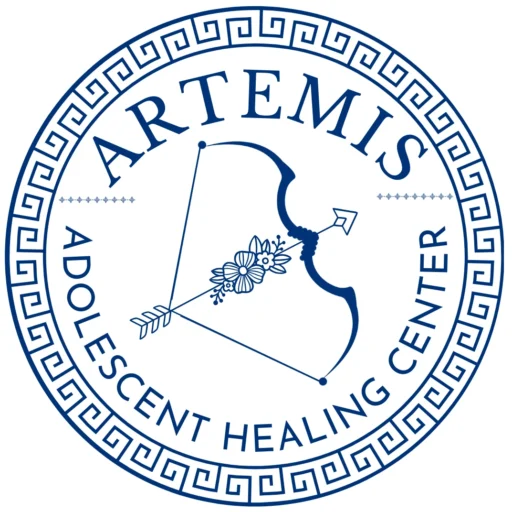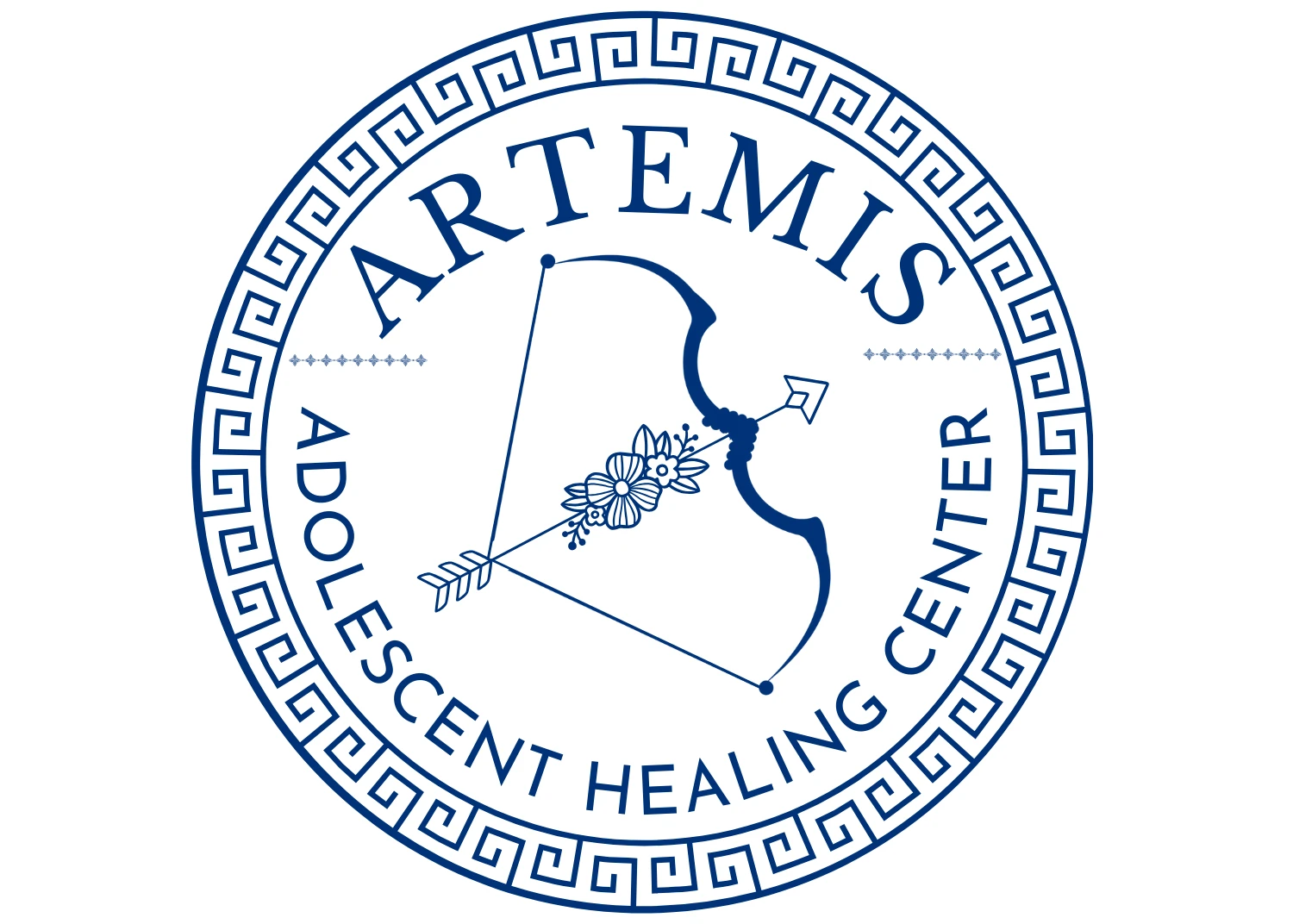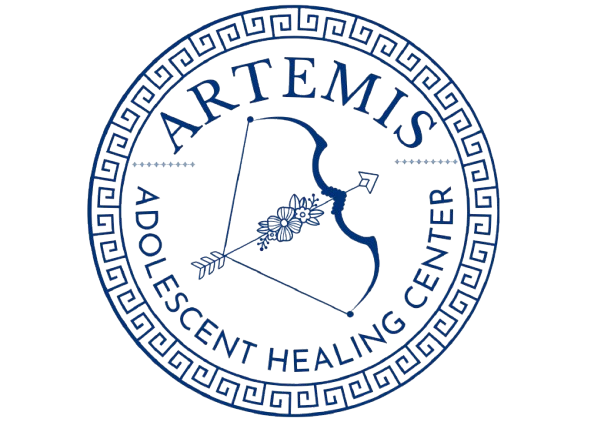Support for Young People to Overcome PTSD and Trauma Disorders
No parent has probably envisioned themselves in the situation of seeking teen trauma treatment for their child. Still, PTSD in children and teens is not uncommon. Perhaps we should not be surprised with all the challenges our kids face.
Young people today face modern-day problems that most of their grandparents would have found unimaginable – cyberbullying, school shootings, and widespread sexual abuse, among other risk factors.
The trained child psychologists at Artemis Adolescent Healing Center in Tucson are experts in working with adolescents and young adults with mental health conditions, including post-traumatic stress disorder and PTSD. Our facility provides evidence-based teen trauma treatment programs at all levels of care.
Leaving children and adolescents who need help processing a scary event without help can make the trauma symptoms worse, leading to risky behaviors in the future. We invite you to continue reading to learn about how traumatizing events can cause psychiatric disorders and how we can offer you and your child support for healing and a bright future.
Get Accredited Treatment Programs at Artemis
Common Causes of Mental Health-Interfering Stress in Teens and Young Adults
Most children and teens who have experienced trauma will naturally process the traumatic event and recover from it. However, research shows that approximately 5%, or 1.71 million adolescents will need professional help, especially when traumatic experiences are recurring or ongoing.
Some of the events that can cause younger children, teens, or young adults to develop PTSD are the following:
- Sexual assault
- Physical abuse
- Physical assault
- Natural disasters
- Diagnosis of a serious illness in themselves or a parent
- Witnessing violence
- Car accidents
- Ongoing bullying or cyberbullying
- School shootings
- Living in poverty or hunger
- Loss of a parent or other close loved one
It’s unclear why some teens develop PTSD or depression after these or many other traumatic events. Some researchers believe that events that are more violent and those that happen to the teen or a sibling or parent are the likeliest to become problematic. A child’s age when the event occurs may also contribute to childhood PTSD symptoms.
A Traumatic Event Can Cause Several Mental Health Disorders
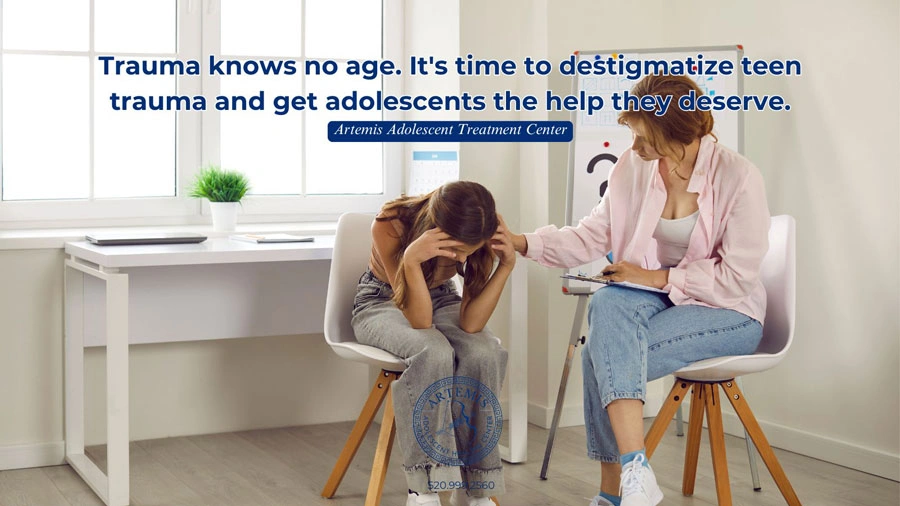
Teens struggling after a traumatic event can develop several mental disorders. A mental health evaluation may be necessary if symptoms are severe or persist a few weeks after the trauma, a.
Post-Traumatic Stress Disorder (PTSD)
PTSD is probably the best-known mental health disorder resulting from trauma. As the brain tries to make sense of the traumatic experience, the teen replays it in the mind. That can mean worsening symptoms, such as developing anxiety disorders, substance abuse, or other mental illnesses.
Symptoms of PTSD
- Flashbacks, or traumatic reenactment in the mind
- Nightmares
- Severe anxiety or emotional distress
- Avoiding places that remind them of the trauma
- Difficulty with focus or concentration
- Irrational behavior or angry outbursts
- Hypervigilance
- Exaggerated startle response
- Headaches
- Fatigue
- Stomachaches
Speak with your child’s pediatrician or call Artemis to discuss how to treat these PTSD symptoms. Another form of this disorder is increasingly being recognized as well, and is known as Complex Post-Traumatic Stress Disorder, or CPTSD. This involves extended trauma, layered over years and across a person’s lifetime.
Adjustment Disorders
Adjustment disorders occur when teenagers cannot cope with a stressful event or change in their lives. These could be anything from a move to a new city to a parent’s divorce. This condition can affect children and teens of any age, from toddlers to young adults.
Symptoms of Adjustment Disorders
- Pervasive sadness or hopelessness
- Frequent crying
- Easily overwhelmed
- Anxious feelings
- Nervousness
- Difficulty concentrating or focusing
- Withdrawal from social activities
- Changes in appetite
- Headaches
- Stomachaches
Children need parental support and trauma-focused therapy if the mental and physical symptoms don’t resolve on their own.
Reactive Attachment Disorder (RAD)
RAD usually develops in younger children but can continue in older children if the trauma remains untreated. It often results from early neglect or in those sexually abused by family members. Without treating trauma, children and adolescents with RAD have difficulty forming healthy relationships as adults.
Symptoms of RAD
- Distrustful of others
- Separation anxiety from a trusted adult
- Detached, withdrawn behavior in social circles
- Trouble forming friendships
- Aggressive behaviors or emotional outbursts
- Difficulty “reading the room” in social settings
These symptoms can carry into adulthood and create a host of issues, including perpetuating the trauma by entering into abusive relationships.
The Risks of Untreated PTSD
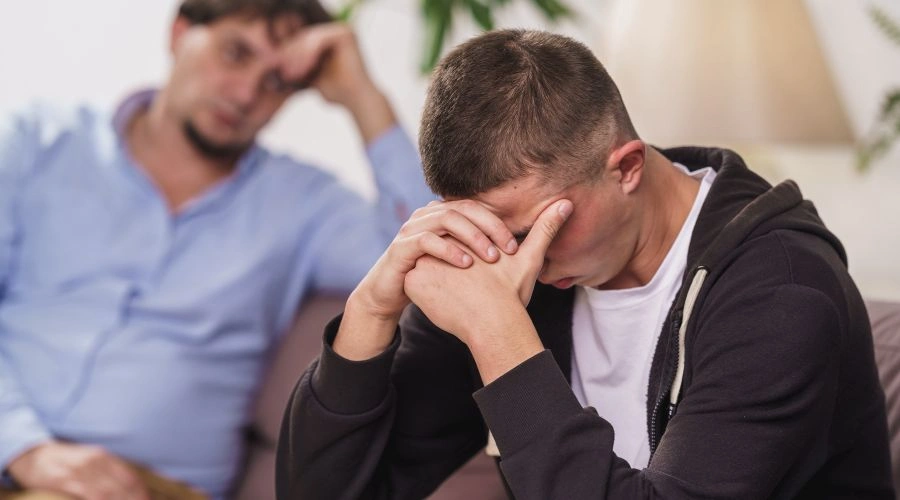
Trauma can create unwelcome chaos in a child’s life, with the aftermath continuing into adulthood. Here are some of the possible outcomes if you don’t find a mental health professional to help treat PTSD for them:
- Chronic Mental Health Issues: Untreated trauma can be the source of additional mental health conditions. It can lead to adult life filled with PTSD, anxiety disorders, substance use disorders, or depression.
- Relationship Problems: Trauma can impact a teenager’s ability to form good relationships. It leads to isolation and a lack of good judgment in future relationships.
- Academic Concerns: The psychological and emotional fallout of trauma can reduce a teen’s ability to focus, learn, and complete school. That can impact their ability to work in a rewarding career later.
- Likelier to Experience PTSD Again: Teens with untreated trauma may have a higher risk of becoming stuck in a loop of trauma. They face additional traumatic events, and their mental health can continue to decline.
- Suicidal Thoughts: In the worst cases, those re-experiencing the trauma may tragically end their lives to be free of the stress.
At Artemis, our mental health treatment programs for young people can help lower the impact of the traumatic memories while also teaching the teen coping skills they can use to manage their trauma safely and effectively.
Get Confidential Trauma and PTSD Assessment
Dana Survived Sexual Abuse and Healed at Artemis
‘Dana,’ a 14-year-old client, had been struggling with a secret since she was 6 – her teenage cousin had been sexually abusing her for years. It started when she was so young that she didn’t realize it was not “normal” behavior. Her cousin told her to keep quiet; it was a special secret between cousins, he had explained. It made sense to Dana’s immature mind. Although it caused physical pain every time he did things to her, she never told a soul about the repeated incidents.
Around age 11, Dana realized that the behavior was unacceptable and became sullen and withdrawn, scared to tell anyone. She feared her mom would never believe her, so she stayed in her room and drank beer pilfered from the fridge. When she started having nightmares and drinking more often, she finally admitted the sexual assaults to her mother.
Her mother knew Dana needed help and found that the teen trauma treatment program at Artemis accepted their BCBS health insurance plan. Cognitive processing therapy helped her break free of the memories that had tormented her for years. She also received assistance with her self-esteem. Dana, her mom, and her younger brother had family therapy to open good communication channels.
The treatment options helped Dana become a more confident person. Today, she understands that she’s not at fault. Dana’s mother is now in therapy, dealing with the guilt of not knowing about her daughter’s trauma. They stick together as a family and have set definite boundaries with extended family members.
Treating Traumatic Events in Teens and Young Adults
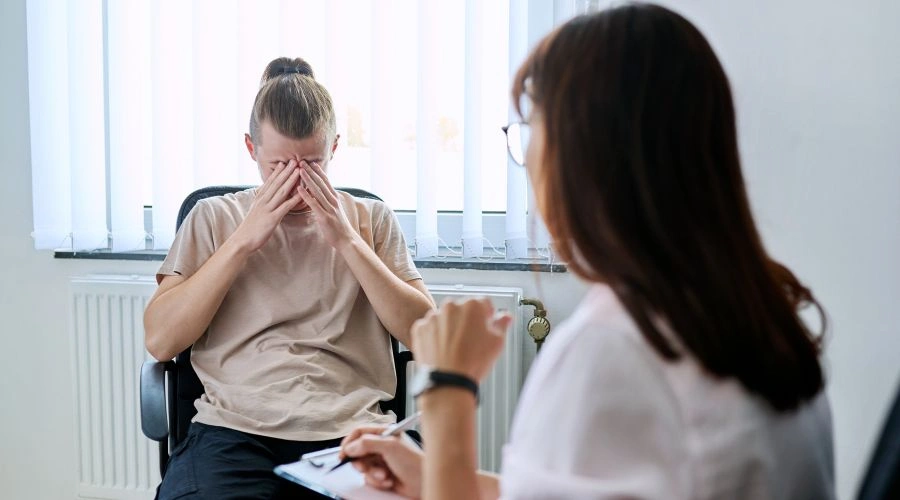
What can you expect from the Artemis team? We provide a complete evaluation of every teen before starting treatment to learn their needs and provide a custom-fit program. Each young person will have a holistic, evidence-based program.
Outpatient or Residential Treatment
We can provide care on an outpatient or inpatient basis, depending on the client’s specific needs. Inpatient or residential treatment allows a teen who has experienced trauma to be in the most intensive setting. They have access to a team of specialists around the clock.
With outpatient treatment, the adolescent can attend school during the day, come to the treatment center for support in the evening, and return home overnight.
Treating Co-Occurring Disorders
Many who suffer from trauma use drugs or alcohol to cope with the flashbacks, anger, or other symptoms. When PTSD in children co-occurs with a drug or alcohol addiction, we treat both at the same time to ensure complete healing.
It’s hard for parents to admit their child uses drugs – or even deny it. But remember it can happen to any family. A famous example of a child becoming addicted to alcohol and drugs is Drew Barrymore, who started drinking at age 9 and used drugs by age 12 before seeking help dealing with the pressures of childhood stardom.
Talk Therapy (Psychotherapy)
We use evidence-based methods to help confront and process the pain of a traumatic event based on individual needs. Some of the therapies we rely on include:
- Dialectical behavioral therapy (DBT)
- Cognitive behavioral therapy (CBT)
- Eye movement desensitization and reprocessing (EMDR)
- Motivational Interviewing (MI)
Several factors influence which therapies will work for each teen; we decide on the best treatment one client at a time.
Music or Art Therapy
Teens often lack the verbal skills to explain the experienced trauma clearly. In those cases, our skilled music or art therapists will help them express their pain using these alternative mediums.
Anti-anxiety Medications
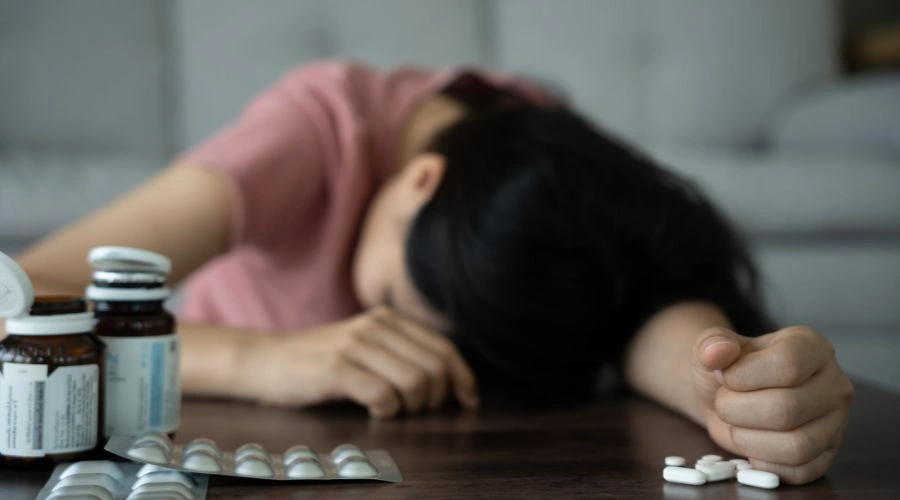
When anxiety surrounding the traumatic event persists, we supplement therapy with selective serotonin reuptake inhibitors (SSRIs). This medication helps the client to feel more secure and stable.
Aftercare Planning
Every teen who graduates will leave treatment with an aftercare plan to prevent them from triggering the trauma again. That can mean helping them set goals or developing a list of “safe adults” to call if they feel symptoms. It might also suggest attending local SMART Recovery meetings to keep the positive behavior flowing.
Up To 100% of Rehab Costs Covered By Insurance
Artemis Provides Effective Teen Trauma Treatment
Trauma symptoms can have a devastating effect on teens and young adults, with untreated trauma symptoms opening them up to additional mental health conditions. Artemis provides a safe space and helps them process the mental and physical symptoms, setting them up for a successful future.
If your teen needs help, contact Artemis Adolescent Healing Center today for a free, confidential evaluation.
